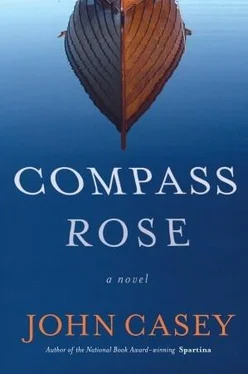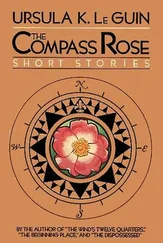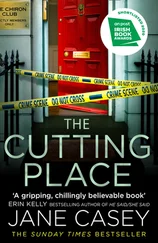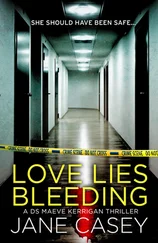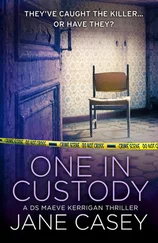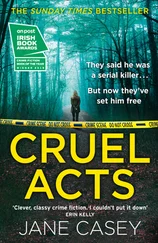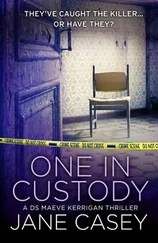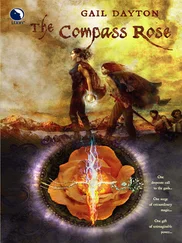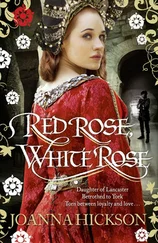There was hardly room to move, but everyone was moving. Mary backed away from a boy carrying a tray of pizza slices. The boy tenor. She said, “Great job.”
He held the tray out to her. “Have some. You somebody’s mom?” She shook her head, and he spun away. She fended off the cousin soprano who was avoiding the pizza tray. Mary said, “Good job.”
The girl threw off a “Thanks,” then took another look at Mary. “Sawtooth? I’ve seen you … You’re not Rose’s mother, are you?”
“Just a friend.”
“Sweet. She’s over there.” The girl slanted her eyes toward the far corner. “Our wunderkind.”
Rose was sitting on a folding chair surrounded by all the Pierces. She’d already changed; she had her maid’s uniform draped over her arm, the cap in one hand. A shame she hadn’t something prettier than a sweatshirt and jeans. May took the costume and said, “You don’t want this smashed around in some big machine, somebody giving it a lick and a promise with a heavy iron. All those pleats in the skirt. I’ll put a little starch in the apron and the hat. No starch in the ribbons. Starch’ll make them too heavy to fly out.”
A large man moved past Mary and planted himself in front of Rose. The white-haired baritone father. “What did I tell you? Old but true — a shaky dress rehearsal makes for a good opening night. And you were absolutely alive.” He took in Dick and May. “And these must be your proud parents …”
Mary saw the man’s elbows flap once — he was in the same state of prattle she’d been in with Sally. Rose said, “This is Mr. Callahan.” Mary suspected he knew he’d got something wrong — he looked a little flummoxed. She was about to join in to distract everyone, but they were all dazzled by a camera flash. It was the cousin soprano. She snapped another picture and whirled away without a word. Rose stood up. “And this is my father, Dick Pierce. His wife, May. And these are my brothers, Charlie and Tom.” Rose saw Mary and said, “And behind you is Mary Scanlon. She and I sang at Miss Perry’s funeral together.”
Mr. Callahan swung around eagerly. “I’ve heard it was glorious. Of course, a sad occasion. I didn’t mean … I didn’t know Miss Perry, I know of her.”
Mary got a grip on his shoulder to settle him. She said, “As soon as I heard your voice tonight I knew we were in good hands.” She turned him round, gave him a good, sensible pat, and looked at May to see how she was taking all this backstage blather. Mary said, “Reminds me of Saturday night at my old place.” But May was staring at Rose with the same look as when she’d got down on the floor to give baby Rose a teddy bear.
And Rose? Although it had pleased Mary to see Rose handle a small awkwardness so smoothly, it also pained her to see Rose so perfectly self-possessed. She should be running around the room with the other kids, enjoying the last bit of buzz. The only one of the cast who had a word for her was this middle-aged baritone. Though, fair’s fair, he knew what he was up to onstage, and he had the right word for Rose.
Charlie excused himself, saying he had to get up early. Tom cocked his head, about to make one of his remarks. Charlie shook his head once to shut him up. Rose followed Charlie for a few steps. Mary heard her say softly, “Thanks for coming. And thank Deirdre.” Another trip wire Rose stepped over neatly. On her way back to her chair Rose said to Mary, “Where’s Mom?”
Mary said, “She probably got stuck in the hall with Jack. Let’s go see.” She took Rose by the shoulders. Rose was stiff as a board, her eyes heavy. Mary said, “Come with me for a minute. Is there another door out of this madhouse? We’ll just step outside for a breath of air.”
They walked single file behind the stage along a narrow corridor made narrower by a cluster of ropes and pulleys, and down a staircase and out onto a loading dock. Mary said, “Aw, Rose, you should feel like a bottle of champagne.”
“Yeah, right. Are you blind? Are you so dumb you can’t see how fucked up it all is? Everything. There’s not one normal person in my whole life. Not one. Mom should have given me up for adoption.”
Mary said, “Aw, Rose,” and held her arms out.
Rose batted them aside. “Why didn’t you tell her? You were her big pal back then. Never mind — you wanted a baby, too. Except when you finally saw how fucked up it is, you moved out.”
“And not a minute too soon.” As quick as the words were out of her mouth, Mary wished them back. She closed her eyes. She’d been stung so fast in so many ways — her forearm still hurt where Rose had swatted it, and yes, she’d come to want Rose to be hers but not the way Rose said it, and yes, she’d moved out, she’d moved out for all their sakes, but try explaining that to Rose when she was spitting out every drop of poison in her. At the same time she saw Rose in the corner of the greenroom in the middle of the Pierces, as if posing for a family portrait — Rose putting on as stiff a face as she could — and all the while she must have been wondering what sort of a picture the other kids were seeing, what sort of curious or clever remarks she’d hear or overhear the next day. Mary had seen enough of this smart set as they lolled about on the porch at Sawtooth, making comments about someone’s pathetic tennis game or someone’s too-cute name for a boat. Maybe the whole school wasn’t like the Sawtooth bunch, but from the sound of them they were the ones who were good at games, who could shrivel the son of the owner of the Dodge dealership in Wakefield or mock the dutiful straight A’s of the Tran girls. And here came Rose, the new girl in the tenth grade — or whatever they called it here — and who was she? She was Jack Aldrich’s niece; she was the music teacher’s pet, and so she got a starring role — did she think that made her hot stuff? But there was the rest of the story. And now Mary saw what the cousin soprano was up to, taking a picture of the Pierce family and the bastard daughter.
The light from the building reached as far as the edge of the woods, where it blurred into the night mist. Mary said, “I don’t mean that, Rose. I miss you something terrible. I miss being in our house together. It was just that I thought I was only making things worse between you and your mother — the pair of you as fierce as you are.”
“You know what Mom’s doing now? She’s going to work here. You could have talked her out of that. If Uncle Jack wanted to help he should have helped some other way. And he is so full of shit. He thinks this place is like happy valley. In his dreams.”
Mary said, “I’m not sure it would be different anywhere else, you coming in as a new girl and all. I went to parochial school, and the top girls there got after me. It’s the girls, isn’t it? But it can change as fast as the weather. It’s just a shame you had your cast party spoiled. But that white-haired baritone got it right, you know. I knew you could sing, but you played the part as if you were her. And that little tenor — not a big voice but a sweet voice. You did right by him in your duets, you sang it piano so he could keep in the game but a piano that has some sauce in it. And your quartet! You were flying there, Rose, just opened up and soared. It’s a nice piece of music, that, and the timing’s tricky. All of you, your sweet boy tenor, and the baritone …” Mary touched her shoulder. “So, Rose, darling, you’ve had your say out here, and now it’s time to go back in — never mind the jealous ones, but have a word with the ones who helped. There’s the musicians in the band. They’re not schoolboys, so you thank them. I’ll be right with you.”
Rose had listened with her head down but at the last looked up. “Okay. But you won’t talk too much, right? I mean, it’s nice what you just said, but let them—”
Читать дальше
